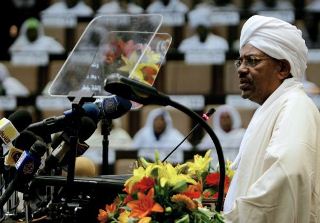UK Parliament debates Bashir’s ICC arrest warrant
May 31, 2012 (JUBA) – Lawmakers in the British Parliament last week questioned their government’s commitment in securing the arrest of Sudanese President Omar al-Bashir and others indicted by the International Criminal Court (ICC) for crimes against humanity, war crimes and genocide.

Baroness Caroline Cox, another lawmaker drew attention to reports that al-Bashir deposed the democratically-elected governor of South Kordofan state in Sudan and replaced him with Ahmed Haroun.
“Ahmad Harun, who is also indicted by the ICC and has since been carrying out systematic slaughter and aerial bombardment of his people, leading to the displacement of hundreds of thousands of people,” Cox told the House of Lords.
In response, the UK minister of state, foreign and commonwealth office informed the House of Lords that the ICC relies entirely on state co-operation to ensure enforcement of its arrest warrants. Lord Howell of Guildford said the British government, together with its European Union partners, frequently raises the importance of states fulfilling their international obligations and taking the necessary steps to bring to justice individuals indicted by the court.
The ICC’s new chief prosecutor, Fatou Bensouda from Gambia, this month dismissed claims that the institution is pro-Western and anti-African; the majority of the entrants on their most-wanted list being Africans. She said her “focus is on Joseph Kony, on Bosco Ntaganda, on Ahmad Harun, on Omar al-Bashir.”
“Those currently fugitive from ICC warrants should be reminded that they, like Radovan Karadzic and General Mladic, cannot evade the international justice system indefinitely,” the UK minister told lawmakers.
The Hague-based court in March 2009 found the Sudanese leader guilty of war crimes and crimes against humanity allegedly committed in Sudan’s western region of Darfur. The conflict, which started in 2003, according to the United Nations, has killed nearly 300,000 people and displaced thousands.
The ICC’s then chief prosecutor, Luis Ocampo, came under pressure for the decision to put out a warrant for an sitting head of state. Bashir reacted by evicting various non-governmental organisations from Darfur.
Haroun is wanted for war crimes and crimes against humanity committed in Darfur. He defeated Abdelaziz al-Hilu to become governor of South Kordofan in an election described by many as rigged in 2011. There is currently a bloody conflict in the state which borders South Sudan, which is causing the displacement of thousands.
Regarding the conflict in Darfur and South Kordofan, Lord Alton wondered how much resources the UK government was committing to facilitate the ICC’s work in apprehending indicted war criminals.
“What resources are we committing to the work of the ICC? When a head of state is indicted by it, how is that reflected in the conduct of our economic and diplomatic policies?” he asked.
However, the minster for the state, foreign and commonwealth office said the British government was closely following events at the ICC, despite the long years it has taken to arrest wanted fugitives. He cites Uganda as one of the countries fulfilling its obligation as a signatory to the ICC, having recently captured Caesar Acellam, a top LRA commander.
Some lawmakers also wondered why Britain was reluctant to intervene in the South Kordofan crisis, where thousands have been displaced by air bombardments carried out by the Sudanese government. Another
legislator said the suffering in South Kordofan was “worse” than the that which occurred in Libya.
But Lord Howell of Guildford reiterated his government’s commitment to resolving Sudan’s conflict, saying a lot was being done in collaboration with international agencies to bring some hope to this very “unpleasant and ugly situation”.
Rob Williams, chief executive of War Child UK, responded to Alton’s comments by describing the ICC as “distinct disappointment.”
(ST)
